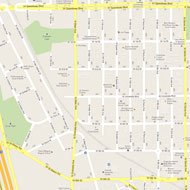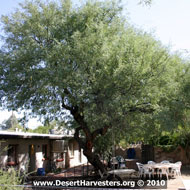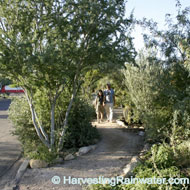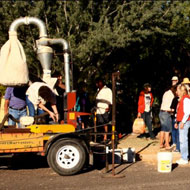Background
Desert Harvesters is a nonprofit organization based in Tucson, Arizona, which promotes local food production by encouraging the native, food-bearing shade trees such as Velvet Mesquite. Desert Harvesters was initiated by Brad Lancaster, author of Rainwater Harvesting for Drylands and Beyond. One of the key success stories of this movement can be experienced in the Dunbar/Spring neighborhood, which is bordered by Speedway Blvd to the north, Stone Avenue to the east, Sixth Street to the south and the Union Pacific railroad and Main Avenue to the west.
Since 1996, more than 1,200 trees have been planted in Dunbar/Spring thanks to an annual tree-planting program and residents’ participation, including Mesquite, Palo Verde, Acacia, Hackberry, Ironwood and Desert Willow trees. The trees are planted in planting areas along the sidewalks and traffic circles. A key part of the street improvements has been the installation of traffic circles. Each traffic circle is taken care of by the residents living at the corner, growing various edible plants with street runoff. Some of the streets such as 6th and 9th Avenue are now filled with vegetation and large shade trees. The trees, which are purchased in five-gallon tubs for $8 each, come from Trees for Tucson, a local nonprofit program (Innes 2010).
Besides using trees which promote food production, Desert Harvesters’ also creatively found a way of harvesting the rainwater—by cutting out a part of the curb and creating a water-catching basin around the native plants. As a result, the planting palette and the rainwater harvesting made the most of the desert climate of Tucson, which gets about 12 inches of rain per year.
Desert Harvesters holds many events to encourage public participation and to educate local residents on how to harvest and process their produce. Since the organization purchased a hammer mill in 2003, they host an annual milling event, helping communities’ process mesquite flour. At the Dunbar/Spring breakfast, they proudly serve mesquite/whole-wheat pancakes made with all organic, local ingredients. The mesquite flour is made from native Velvet mesquite pods hand picked by Desert Harvesters around Tucson – with most of the pods picked from trees planted within the Dunbar/Spring neighborhood. The Desert Harvesters website also provides manuals for water harvesting, guides for eating native plants and recipes for cooking (visit http://www.desertharvesters.org for more information).
Lessons Learned
Potential Benefits:
- Creates a “mesquite guild,” a small community of plants and animals. Underneath a mature mesquite tree, plants that need nitrogen benefit from the nitrogen-rich mesquite and the shade it provides. The mesquite guild attracts wildlife, such as native birds that provide fertilizer and reseeding. Lancaster says having trees shade up to 75 percent of a street's surface can cool summer neighborhood temperatures by up to 10 degrees Fahrenheit (Innes 2010).
- Provides a local food source, including fruits and flowers from native trees.
- Boosts the local economy:The Mesquite Milling Fiesta and Mesquite Pancake Breakfast at the Dunbar/Springs community garden attract tourists from out of town. In addition, individuals have discovered they can earn money by using the locally-produced ground flour in baked goods that are sold at farmers’ markets and at other outlets.
- Builds community through public events, such as tree planting and milling, providing more opportunities for meeting and getting to know neighbors. People also take more responsibility for care of the neighborhood.
- Educates community members about native and edible plants, harvesting rainwater and tree planting. The Desert Harvesters provide educational materials and annual workshops for beginners.
Potential Issues:
- Neighborhood buy-in: Community participation is important to implementing the changes and maintaining the plants on the street.
- The city’s support: Cutting curbs and installing traffic circles require the city’s permission. Planting of native species should also be encouraged through regulation.
- Curbside parking: Curbside gardens should be designed carefully so that the gardens are not trampled when residents enter and exit parked vehicles.
Sources
Desert Harvesters (http://www.desertharvesters.org)
City of Tucson, 2005. “Intersection Volume Counts” (http://dot.tucsonaz.gov/traffic3/adt.php)
Innes, Stephanie, 2010. “Neighbors: Area's Trees Creating Cool Urban Effect” (http://azstarnet.com/news/local/article_1b49c599-0f87-5f2d-a44a-e95c10f37c12.html)
Photo Sources
MIG, Inc.




